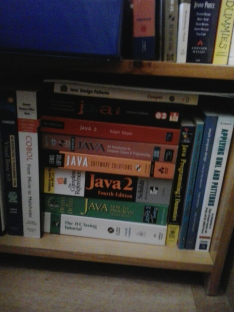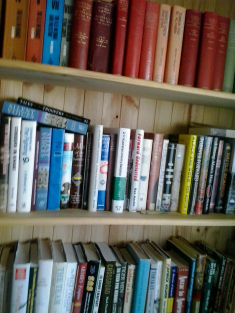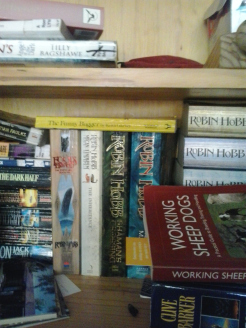Biblio or Myth?

Do I prefer to think of myself as a bibliophile (lover of books) or a story (would this be called a fabliophile or a mythophile or . . .?) lover? Is it something that is separate or do they naturally belong together?
I think they need a bit of separation. Why?
Non-fiction, serious tomes of facts and research and the result of years of hard work and mastery of the subject is what belongs in the non-fiction section. Then there’s the not-quite-as-serious-as-research non-fiction (otherwise known as pop-[you-name-it {eg: psych, culture, etc.}]), which is a lot more prolific these days, sells better and gives the ‘reader’ a line of understanding of sometimes extremely complex subjects. Then there’s the out and out ‘recreational’ non-fiction (the best seller of all in non-fiction).
That’s the non-fiction – and I read within all those areas. These are books, even though they have a structure and layout and should be perused in a particular direction (generally, that is – sometimes secondary research needs must be met by sliding in at a particular point – and then out!).

Fiction, so many genres (and some that blend, bend and distort) out there – how to define and categorise along the lines of non-fiction? Is a story book more ‘serious’ (like the factual tomes of non-fiction) if it’s written by: the qualified person [but don’t forget that the quals may not be as real as the book in your hand, or that quals don’t equal professional necessarily], or the book is the right length (big count of words), or the writer/author is on a best-seller list, or if it follows the ‘theme’ of story based on historical cultures? There are also the ‘age’ lines: child, YA, NA, A, M, F, and a special category all on its own: literary (because it can’t be contaminated by genre, can it?).

That’s a brief outline of fiction. I read in all genres, all ages, all levels of category and style (and I’d like to read in other languages, but TIME, need more time, a long life and . . . another dream). These are all books, whether held in the hand or the e-gadget, and I read them.
Both forms of word structures can inform, create passion, exhort the reader to action or thought, deflate and inflate (think on that a while) – and for every written work out there, I can learn something from that piece of work.
Is a story different to fact? Is there a more serious bent to the non-fiction side of this equation? You know what? I don’t think there is, because, like so many things, like all things – everything changes over time. What is a fact now may [in the future] be something we laugh about!
So, story and fact all belong in the same place, bibliophile is the same as mythophile, and I love them all!
Long live the book, the outline of words that create understanding. And remember:
Discourse creates and shapes perception!





